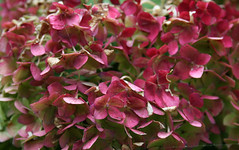Hydrangeas are a favorite shrub of many gardeners because of their eye catching blooms.
The majority of Hydrangeas originate from Asia and North America.
 Hydrangea Macrophyllia (Mophead and Lacecap) are common in the Atlantic border states. They have big leaves, and their blooms come in colors of blue, lavender, pink and white. Other common hydrangeas are Paniculata or panicle hydrangea (PeeGee and family), Hydrangea arborescens (Annabelle) and Hydrangea quercifolia (Oakleaf). There’s also Hydrangea anomola-petiolaris (climbing hydrangea). You can find this last hydrangea growing on the northern side of buildings. Depending upon which variety you purchase, you could have blooms from Summer to Autumn.
Hydrangea Macrophyllia (Mophead and Lacecap) are common in the Atlantic border states. They have big leaves, and their blooms come in colors of blue, lavender, pink and white. Other common hydrangeas are Paniculata or panicle hydrangea (PeeGee and family), Hydrangea arborescens (Annabelle) and Hydrangea quercifolia (Oakleaf). There’s also Hydrangea anomola-petiolaris (climbing hydrangea). You can find this last hydrangea growing on the northern side of buildings. Depending upon which variety you purchase, you could have blooms from Summer to Autumn.
If you’d like to have a garden that almost always has something in bloom, plant hydrangea near rhododendrons, azaleas and or forsythia and you’ll have blooms and color from spring through to fall. I also have my hydrangea growing near a lovely clump of peonies.
Some species of Hydrangea, the Macrophylia in particular, will bloom either pink or blue depending upon the PH of your soil. Acidic soil will produce blue or violet flowers, while a slightly alkaline to neutral soil will give you pink or white blossoms. Hydrangea blooms can range from 5 to 10 inches in diameter depending upon the species.
How to grow Hydrangeas:
- Hydrangeas prefer light to medium shade, although large leafed hydrangeas seem to be able to handle full sun if they are given enough water.
- Hydrangea’s need moist well draining soil.
- Hydrangeas don’t require a lot of fertilizer. A good feeding in the spring is often sufficient. Compost or manure mixed into the soil near the plant will often be sufficient. You might also want to try Liquid Seaweed extract. It’s an organic fertilizer.
Pruning:
Big leaved Hydrangeas flower on old wood (previous seasons growth) so if you must prune only prune about a third of the weakest growth in early spring. Otherwise, prune immediately after your hydrangea has flowered.
You can visit this site to learn more about the proper care of your species of hydrangea. You might also want to visit the Hydrangea Forum at GardenWeb and talk with other hydrangea owners and gardeners.